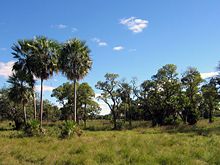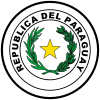Tourism in Paraguay
This article has multiple issues. Please help or discuss these issues on the talk page. (Learn how and when to remove these template messages)
|


Tourism in Paraguay employs 9500 people, according to data from 2010.[1]
According to figures from the World Tourism Organization, for the period 2013-2014 Paraguay was the least visited country of South America after Guyana and Suriname, with only 610,000 international tourists.[2]
The activities in establishments, such as lounges, provide contact with the customs and traditions of Paraguay. Typical meals like sopa paraguaya, asado al asador, home made oven cooked chicken, the sweets and marmalades are an attraction. In rural areas and establishments can be seen crops of sugarcane, maize, cassava, snuff, coffee, peanut, rice, sorghum, tung and spurge, and other fruits of the Paraguayan land, among which are the avocado, handle, papaya and pineapple.
The rescue of the native culture, of the peoples of Amazonian origin that had to land as the mother who provides food and livelihoods, are the characteristics that can be seen in the rural tourism of Paraguay.
Foreign tourism[]
The entry of foreign tourists in 2011 registered an increase of -12% over the previous year. The number of visitors entered was of 520,926, while in 2010 it was of 465,264.[3] In 2015, the number of foreign tourists exceeded 1.2 million.
Cerrito is located 120 km from the town of Pilar. There is received the visit of tourists of Brazil, Germany and Argentina, which are attracted by the fish resources available to it.
Arrivals by country[]
Most visitors arriving to Paraguay on short-term basis in 2015 were from the following nationalities:[4]
| Rank | Country | Number |
|---|---|---|
| 1 | 848,387 | |
| 2 | 190,003 | |
| 3 | 19,479 | |
| 4 | 18,896 | |
| 5 | 17,946 | |
| 6 | 15,9 | |
| 7 | 15,582 | |
| 8 | 10,419 | |
| 9 | 9,639 | |
| 10 | 9,000 | |
| Total | 1,214,613 |
Tourist assets[]
Natural areas[]
There are numerous places where one can practice adventure tourism in Paraguay. Several of them have prepared an infrastructure that allows the practice of extreme sports: zip-lining, rappelling, hiking through thick forests, up and down of hills and streams that invite to restful. Activities include walks, hiking in sulky, cavalcades, guided tours, among others. One can also perform educational scientific research in the various reserves, observing the fauna and flora, part of the characteristic spaces in rural areas. Paraguay's protected areas are found throughout the territory.
Sport fishing[]
The flowing rivers have conditions for the fishing, tours and executions. Paraguay is a country with major water sources, the most important are the Paraná River, the and Paraguay River. It also has several lakes, estuaries small streams. The variety of fishes offered by these rivers is good, because it has several species of different sizes. Among the most prized species are the Surubí that, for anglers, is one of the coveted specimens. This is due to the size it can reach. Round about 50 kg, was also recorded unique pieces up to 100 kg, which can measure up to 2 m long. Also highlights the Dorado who is famous for its acrobatic jumps, making it the biggest haul when fishing.
One of the richest cities in the production of fish is Villa Florida, whose beaches Oversees
the Tebicuary River. In this city, the popular sport is fishing and cuisine has several dishes made with fish, such as Pira caldo (a Paraguayan fish soup). Here out fishing contests, which are controlled by control agents, who are responsible for the proper performance of the established laws, as well as the elements and used boats. Are also controlled the size and weight of the fish.
Fishing in Paraguay is being controlled, as some species are endangered. One of the rules made to remedy this situation, is the closure period, in which fishing is prohibited for several months.
References[]
| Wikivoyage has a travel guide for Paraguay. |
- ^ "Tourism in Paraguay: of recreation to economic sector with great potential (in Spanish)". ABC Color. Retrieved December 13, 2012.
- ^ "World Tourism OIrganisation (UNWTO) Tourism Highlights". E-unwto.org. 2014. Retrieved 2017-02-28.
- ^ "El turismo generó USD 240 millones en el 2011" [Tourism generated US$240 million in 2011]. Última Hora (in Spanish). Retrieved December 25, 2012.
- ^ Ranking de turistas a Paraguay, por año, según nacionalidad. Período: 2010 - 2015, 168.90.176.30
≤±≥″≤−×−≥≠≠″×±°×÷→÷−
- Tourism in Paraguay
- Tourism in South America by country

